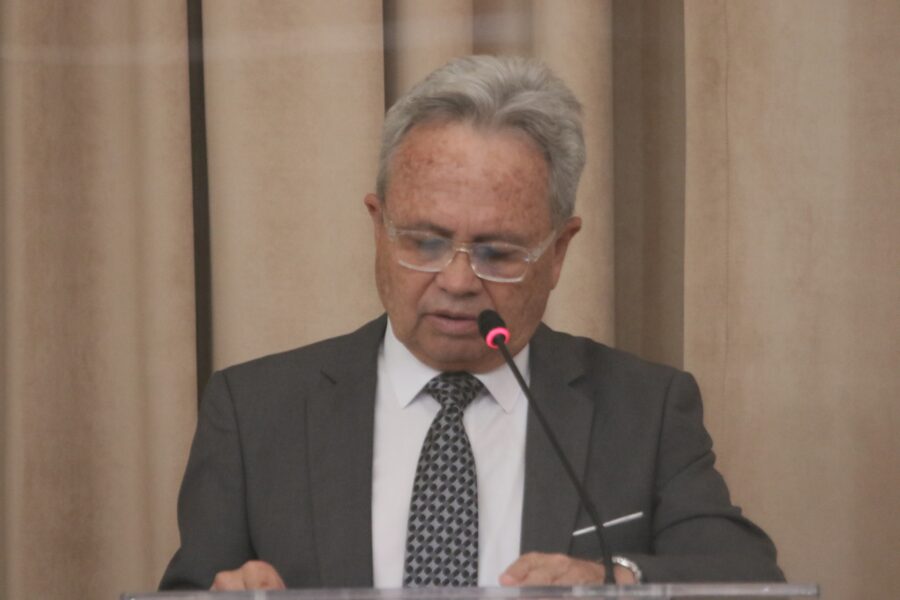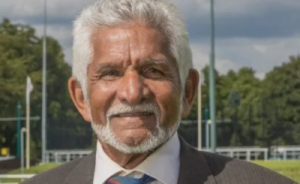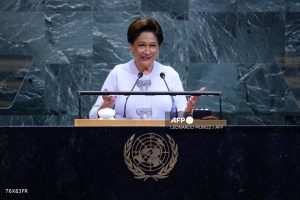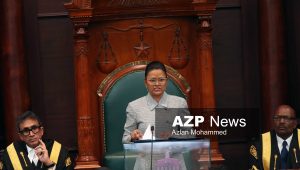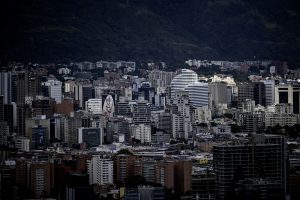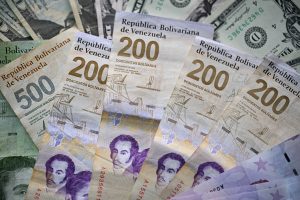PORT OF SPAIN – The Trinidad and Tobago government Tuesday said that the public should not be held to “ransom” with a threat of increased prices for the restructuring and rationalisation of a foreign exchange service that was introduced as a “temporary measure” during the coronavirus (COVID-19) emergency.
Finance Minister Colm Imbert said it was well known that in 2020, as a result of the looming trade crisis brought on by the pandemic, the government took the decision to temporarily allow wholesale importers of essential goods access to EXIMBANK services.
He said that the entire initiative was again outlined in the 2025 national budget and that it was well known that the initiative was “always subject to periodic review.”
Over the last weekend, Imbert announced that during Covid, the government created a special window at the EXIMBANK to provide United States dollars for essential imports, such as food and medicine.
“Covid is over, so we are reviewing the feasibility of that forex window,” he said.
But the move has resulted in calls for the government to rethink its position with the President of the Trinidad and Tobago Chamber of Commerce, Kiran Maharaj, being quoted in a local newspaper as saying that while the private sector group was alerted beforehand of the review of the EXIMBANK facility, a specific time when the review would be over was not given.
She said members require foreign exchange (forex) “in a timely manner to ensure that containers of goods, including essential items, can get to Trinidad and Tobago to fulfil the regular demand.
“Suppliers will not send shipments unless they get paid,” she said.
Local newspapers reported Tuesday that local manufacturer, Ramsaran’s Dairy Products (RDP), had written to the Central Bank governor, the Auditor General, and the International Monetary Fund (IMF) complaining about the lack of information on the distribution of foreign exchange.
RDP founder Rajnanan Ramsaran, in calling on the Washington-based financial institution to intervene in the matter, wrote “from my perspective, there appears to be an unfair distribution of what little forex that is available with no equality nor equitability among the business community and by extension the citizenship of Trinidad and Tobago.
“…The Ministry of Finance’s assertion that the requested documents do not exist raises serious concerns about the governance framework and the corporate responsibility within TT’s public financial institutions.”
He also asked the IMF’s managing director to confirm if Trinidad and Tobago has been in full compliance with the fund’s regulatory framework, particularly on the proper management of forex.
“These are not obscure or specialised requests but rather essential records that any well-managed financial institution or government ought to have readily available.”
In April 2020, Cabinet approved the establishment of a special foreign exchange window through EXIMBANK, providing US$75 million – US$25 million a month for three months – to established importers
In a statement, Imbert said that he wanted to correct a series of “misleading and inaccurate stories about access to foreign exchange,” saying that one newspaper in particular had been peddling the stories as if they were factual.
“This media campaign is clearly mischievous, and it is necessary to set the record straight,’ Imbert said, adding that a perusal of the EXIMBANK of Trinidad and Tobago’s website reveals that its mandate is to “facilitate the growth and expansion of the non-energy export and manufacturing sectors in order to enhance the foreign exchange earnings of Trinidad and Tobago, and to create and sustain employment through our trade finance product portfolio’s coverage to the exporting community.”
Imbert said, “In brief, the purpose of the EXIMBANK is to provide foreign exchange support to exporters in our non-energy and manufacturing sector as part of this government’s ongoing goal of economic expansion and diversification.”
He said that since April 2020, 110 distributors of essential goods such as basic foods and medicines accessed the Essentials Forex Window, which allocated US$1.18 billion to purchase these key staples.
“This facility has mitigated the significant risk of national shortages of basic items and is geared at companies that have an existing or previous history of importing approved essential items. In this process applicants submit their financial statements, as well as Know Your Client – KYC, documentation and projected trade payables to be enrolled.”
Imbert said that once enrolled in the Forex Window Facility, clients submit their trade invoices together with the requisite TT dollars.
“Subsequently, the EXIMBANK wires US dollars directly to the international suppliers for settlement. The local company does not receive US dollars directly,” Imbert said, adding that this arrangement was a temporary one, put in place to ensure the citizens of the country had access to all of its essential items in terms of food, medicine and safety supplies during a pandemic.
“It is not and was never intended to be a permanent entitlement and prior to this arrangement, all importers obtained their forex from their respective commercial banks. This facility, which gave them preferential access to forex was created to ensure the survival of our citizens during the Covid-19 period.”
The finance minister said that contrary to the “misleading and mischievous reports” in the media, foreign exchange from the EXIMBANK “has never been allocated to import vehicles: new or used.
“Nor for that matter, is the forex distributed by the EIMBANK allocated for the importation of luxury items or non-essentials, such as fireworks. Instead, forex from the EXIMBANK has only ever been allocated for importing essential goods, such as basic food and medicine during the Covid-19 period, and principally, for inputs into manufacturing, such as raw materials and equipment.”
He insisted that the foreign exchange from the EXIMBANK “has never been sent directly to any importer” and that “all foreign payments, once verified, are made directly by the EXIMBANK to vetted and validated international suppliers.
“It is a matter of record that wholesale Importers were aware that the forex window for essential imports was temporary. They were also informed in August of 2024, well before Budget 2025 was delivered, that the forex facility was under review and would be amended to return the programme to its original intent and purpose.”
Imbert said, “It is unfortunate that some wholesale importers sought to make purchases without ensuring their source of funds, thus creating problems for themselves.
“The direct provision of foreign exchange by the Government through the EXIMBANK is designed to encourage export manufacturing and economic activity and is a policy intended to promote and support diversification, which no sensible person could object to.
“However, the addition of a second forex window at the EXIMBANK for essential imports during the COVID-19 pandemic cannot create a situation where, four years later, the Government is being held liable by certain private sector businessmen for the items they ordered and received without paying for them,” Imbert added. (CMC)
![]()


